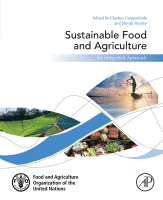In a new book published by FAO and Elsevier, Dr. Prabhu Pingali writes on the public policies necessary to achieve sustainable food and agriculture systems. See Chapter 45 in Sustainable Food and Agriculture: An Integrated Approach.
Chapter Abstract
Over the past 50 years, agricultural growth has contributed to jumpstarting overall economic growth and poverty reduction in many countries, but the progress has not been uniform and has often been accompanied by significant environmental costs. To adequately and sustainably feed the ever-growing population, the sector faces new and greater challenges, for example, declining quantity and quality of the natural resource base that underpins agricultural productivity, evolving food preferences due to rising incomes and growing urbanization, and the impact of climate change. The sector can meet these challenges with both increased and targeted investments in research and development and policies, especially aimed at sustainable intensification of smallholder production systems, increasing climate-change resilience of rural producers, improving input and output market access, reducing food loss and waste, bridging the gender inequality gap, broadening and diversifying the food source base, and promoting conservation and sustainable use of natural resources (e.g., soils, water, and biodiversity).
Keywords
About the Book
Sustainable Food and Agriculture: An Integrated Approach is the first book to look at the imminent threats to sustainable food security through a cross-sectoral lens. As the world faces food supply challenges posed by the declining growth rate of agricultural productivity, accelerated deterioration of quantity and quality of natural resources that underpin agricultural production, climate change, and hunger, poverty and malnutrition, a multi-faced understanding is key to identifying practical solutions. This book gives stakeholders a common vision, concept and methods that are based on proven and widely agreed strategies for continuous improvement in sustainability at different scales.
While information on policies and technologies that would enhance productivity and sustainability of individual agricultural sectors is available to some extent, literature is practically devoid of information and experiences for countries and communities considering a comprehensive approach (cross-sectoral policies, strategies and technologies) to SFA. This book is the first effort to fill this gap, providing information on proven options for enhancing productivity, profitability, equity and environmental sustainability of individual sectors and, in addition, how to identify opportunities and actions for exploiting cross-sectoral synergies.
Key Features
- Provides proven options of integrated technologies and policies, helping new programs identify appropriate existing programs
- Presents mechanisms/tools for balancing trade-offs and proposes indicators to facilitate decision-making and progress measurement
- Positions a comprehensive and informed review of issues in one place for effective education, comparison and evaluation
Editors
- Clayton Campanhola, The Food and Agriculture Organization of the United Nations (FAO), Rome, Italy
- Shivaji Pandey, Special Advisor to the Food and Agriculture Organization of the United Nations (FAO), Rome, Italy


